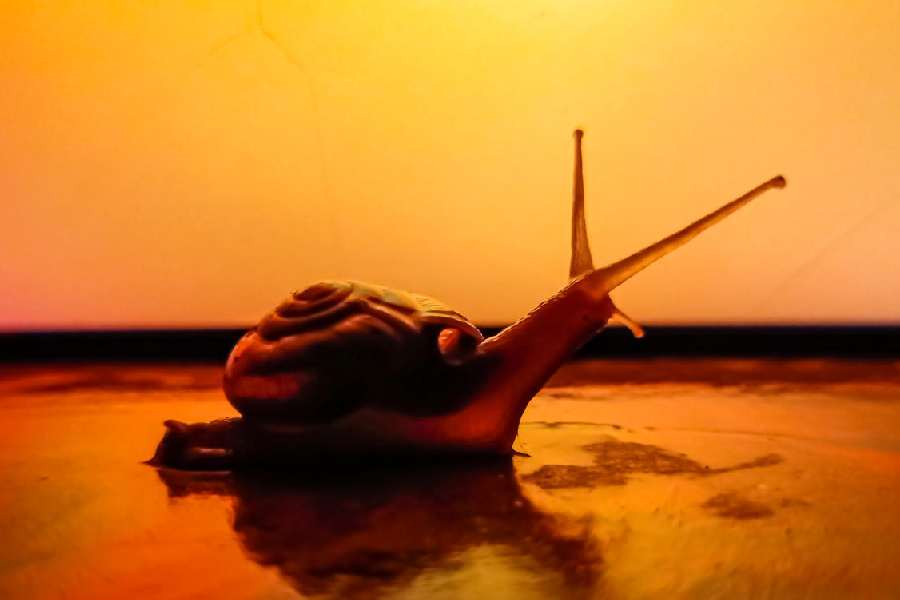Book: ENDLING
Author: Maria Reva
Published by: Virago
Price: Rs 799
Maria Reva’s Booker long-listed novel comes after her debut collection of short stories, Good Citizens Need Not Fear, which was well-received in literary circles. Reva was born in Ukraine but brought up in Canada. The immigrant experience, identity, and their associated anxieties thus find place in Endling, which is set in Ukraine in 2022 with the country on the cusp of war.
On the face of it, Endling is the story of Yeva whose mission in life is to protect snails. She is something of a loner by choice, and lives in a mobile lab with the snails that she has rescued, shunning human contact. To fund her research and her lab, which doesn’t attract sponsors because, as Yeva tells us, snails aren’t cute or cuddly like pandas or koalas, she becomes part of romance tours conducted by the agency, Romeo and Yulia. These romance tours are a way of earning money to keep her lab running but by the time we meet Yeva, she is disillusioned and is preparing to commit suicide.
It is at this point that she meets the sisters, Nastia and Sol, who change the course of Yeva’s life and that of the novel. Nastia is one of the bride candidates in the agency while Sol acts as her translator for the foreigners who come to Ukraine in search of a bride. They are the daughters of a feminist activist who has been missing and whom Nastia wants to locate. Her plan? Kidnap a few bachelors to make a statement. Yeva becomes a part of their plan when she agrees to lend her van for the kidnapping and thus begins the crazy journey of these characters in a country on which war is declared as soon as the bachelors are kidnapped and the women set about on their mission.
While this might seem like a straightforward journey, it isn’t — both for the characters and the readers. For after reading pages of what feels like a conventionally written novel, Reva breaks the frame and makes an appearance herself. We see Maria Reva, the writer, on the pages of the novel as the story is paused and we become part of Reva’s writing life and anxieties through emails to her agent, magazine editors and so on. This metatextual intervention liberates Endling from the conventions of form and goes on to inform the readers’ further reading of the text. The bachelors, interestingly, have no idea that they have been kidnapped. They are under the delusion that they are being taken for a special getaway. This delusion, while the world outside seems to be losing all sense of clarity and certainty, is a source of dark humour in Endling. Towards the end of the book, the worlds of the novel and its writer sitting in Canada merge in a strange but somehow satisfactory way.
The word, ‘endling’, refers to the last surviving member of any species. In the context of the novel, it’s “Lefty”, the snail that is the last member of its species and becomes part of the journey of Yeva and the girls across a war-torn land. It kindles the hope that maybe, just maybe, it can ditch the label of ‘endling’.
Endling is a novel that occupies the space between — and switches — genres as it progresses. This gear-switching, which makes it now a straightforward, realist novel, now an adventure story, now a metanarrative, now a postmodernsqe work, can, at times, feel abrupt and demanding. But there is a touch of deftness in Reva’s writing in which she attempts to handle many themes and ideas, from ecological imbalances and the extinction of species to the absurdity of war as well as the immigrant experience, especially when one is safe in another country while one’s kith and kin are facing the danger of death and uncertainty in one’s homeland. The strength of Reva’s prose lies in the fact that she presents these heavy themes with a lightness of touch as well as a streak of humour. This makes Endling a book that’s not as intimidating as it could have been given its inventive structure and playful form.
Endling, however, is also a novel that will appeal only to a certain set of readers, particularly those well-versed in or interested in the kind of literary fiction that demands the reader’s active participation in and engagement with the text. There are sections in which Endling can feel frustrating, especially if one is looking for a conventional style or a final, clear resolution to the entire adventure, which it doesn’t provide. Perhaps that lack of final answers is the point it makes.










